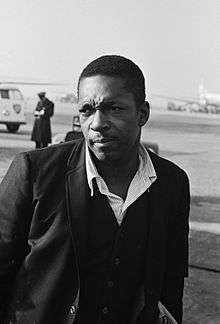
John Coltrane, shown in 1963.
John William Coltrane, also known as "Trane" (September 23, 1926 – July 17, 1967), was an American jazz saxophonist and composer. Working in the bebop and hard bop idioms early in his career, Coltrane helped pioneer the use of modes in jazz and was later at the forefront of free jazz. He led at least fifty recording sessions during his career, and appeared as a sideman on many albums by other musicians, including trumpeter Miles Davis and pianist Thelonious Monk.
Quotes
- I thought about this question. I answered it as best I could [at the press conference]. I felt I didn't tell [the reporter] what I really wanted to say. He thought I was Christian. And I am by birth; my parents were and my early teachings were Christian. But as I look upon the world, I feel all men know the truth. If a man was a Christian, he could know the truth and he could not. The truth itself does not have any name on it. And each man has to find it for himself, I think.
- Liner notes for Live in Japan. Impulse. GRD-4-102, 1991.
- Keep a thing happenin' all throughout.
- Chatter before studio version of "Dearly Beloved", addressing pianist Mccoy Tyner. (1964)[citation needed]
- Rushin' Lullaby.
- Coltrane answering producer Bob Weinstock's question "Trane, what was the name of that tune?". Coltrane and his band were actually playing a fast tempo version of Irving Berlin's "Russian Lullaby".[citation needed]
Quotes about Coltrane
- You know, John Coltrane has been sort of a god to me. Seems like, in a way, he didn't get the inspiration out of other musicians. He had it. When you hear a cat do a thing like that, you got to go along with him. I think I heard Coltrane before I really got close to Miles [Davis]. Miles had a tricky way of playing his horn that I didn't understand as much as I did Coltrane. I really didn't understand what Coltrane was doing, but it was so exciting the thing that he was doing...
- Interview with Wes Montgomery. Gleason. Downbeat (1961), 24.
- In short, [Coltrane's] tone is beautiful because it is functional. In other words, it is always involved in saying something. You can't separate the means that a man uses to say something from what he ultimately says. Technique is not separated from its content in a great artist.
- Cecil Taylor (quoted in Cole, _John Coltrane_, p193)
- John [Coltrane] was like a visitor to this planet. He came in peace and he left in peace; but during his time here, he kept trying to reach new levels of awareness, of peace, of spirituality. That's why I regard the music he played as spiritual music -- John's way of getting closer and closer to the Creator.
- Albert Ayler (quoted in Valerie Wilmer, _As Serious As Your Life_, p31)
External links
This article is issued from
Wikiquote.
The text is licensed under Creative
Commons - Attribution - Sharealike.
Additional terms may apply for the media files.